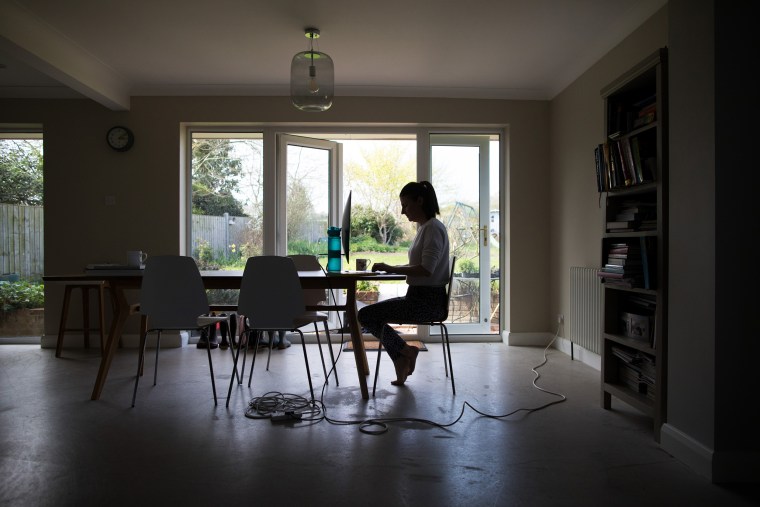Things have been looking up lately in the battle against Covid-19. Cases, hospitalizations and deaths are all trending downward, and we are vaccinating more people every day. But I’ll confess I am not feeling too much of the optimism: We’ve just passed a grim milestone of 500,000 dead from this pandemic and President Joe Biden has warned we may lose upwards of 100,000 more.
We know this can work: Paid shutdowns have helped control the spread of the virus abroad.
So, this is not the time to act as though we’re done with the pandemic and can relax restrictions like Texas and Arizona have done. While we already let down half a million Americans, we still have a chance to save tens of thousands by employing the bold action that’s eluded us until now.
That means executing a national shutdown for all but essential workers that can stop the disease in its tracks once and for all. The concept is sure to face the standard objection that it would cause deep economic hardship. But it doesn’t have to if we implement a paid shutdown.
Many point to the decline in cases and deaths to argue that such a drastic step isn’t necessary, but a number of coronavirus variants are spreading; the more infectious and deadly U.K. variant is predicted to be the dominant strain in the U.S. by the end of March, while there are others, like the South African one, against which the vaccines may be less effective.
The Brazilian city of Manaus offers a cautionary tale — once thought to have achieved herd immunity, a second wave ravaged the city in January despite a high percentage of Covid-19 antibodies in the population for reasons we don’t well understand.
Even if a surge doesn’t come, racial disparities in coronavirus hospitalizations and deaths are still likely to get worse. In Los Angeles County, the Latinx community saw a 1,000 percent increase in Covid-19 deaths since November, and Black, Indigenous and Asian American communities have also been hit hard nationally. This has a lot to do with the fact that more than 50 percent of Black, Latinx and Indigenous workers don’t work remotely. And vaccination rates continue to lag for Black and Latinx people.
A paid shutdown would be effective at stopping the spread by closing most businesses and places where people gather — without leaving workers in the lurch. A study found that the prior spring shutdowns in the U.S. prevented 60 million infections in the country. In fact, a short-term paid shutdown could be more effective than all the lengthy restrictions we’ve seen until now, as those have only been partial.
But even in places that remained partly open, the economy has struggled. That’s because a significant number of people are rightfully choosing to stay home and not risk catching a deadly virus — restaurants in particular have suffered from this. The government has outsourced social distancing as an individual, rather than a collective, responsibility.
The concept of a paid shutdown is simple and would address both issues. Lawmakers like Rep. Rashida Tlaib, D-Mich., have made proposals such as giving every person in the country debit cards with $2,000, followed by monthly installments of half as much money. I myself prefer a model of one check of $3,000 per person in order to match the high cost of living in many places while a monthlong stay-at-home order is issued. Essential workers, meanwhile, should receive hazard pay along with high-quality personal protective equipment.
We know this can work: Paid shutdowns have helped control the spread of the virus abroad. They were significant in allowing countries such as New Zealand and Australia to effectively suppress the virus, and while we may not be able to achieve the same result now, we can lower the death rate. Even in the United Kingdom, whose situation is more similar to ours, the latest shutdown has been called a success by the its Office for National Statistics, citing a dramatic reduction in cases.
Of course, economic concerns aren’t the only obstacles to a complete shutdown. Depression, suicide, loneliness and other mental health issues are serious problems that quarantining the population has exacerbated. However, they can only be addressed through properly ending the pandemic; by hunkering down during the vaccination effort, we can get back to normal faster.
It would be wrong to assume that the idea of a shutdown is unpopular. A December poll found that a one-month shutdown was supported by more than 50 percent of Americans. And a November poll showed that 67 percent of Americans would be somewhat or very likely to stay home if asked to. A poll taken this month shows that Americans are still largely adhering to social distancing anyways.
A paid shutdown hits the pause button. It gives us more time to vaccinate people in an orderly manner and fix our processes. At the same time, it would help address concurrent crises in hunger and evictions by providing people with the paid income support that has been desperately needed throughout this crisis.
Crucially, it also provides support for social distancing — people would feel taken care of and not abandoned by their government. You do your part to protect the vaccination effort, and the government will do its by taking care of your material needs, hopefully restoring some of the lost trust in institutions.
There will be short-term costs, but we have been paying the price of ignoring the virus for the past year and we can’t risk the variants causing more grief and further isolation. Democrats have the majorities in both houses of Congress to make a paid shutdown happen. They should act now before it’s too late.



